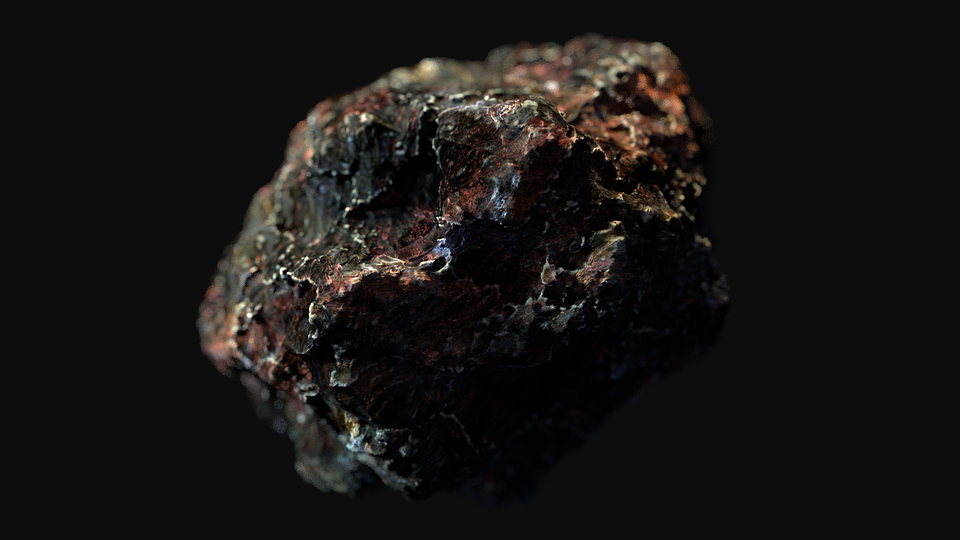"The psychological barrier to mining on asteroids is still high, but actual financial and technological barriers are much lower. Exploration works can cost only a few tens of millions of dollars, and specialists from the California Institute of Technology believed that a spacecraft capable of minerals extraction on an asteroid would cost $ 2.6 billion," analysts of the investment bank Goldman Sachs said in a recent report. Observers note that this figure only seems great: for comparison, investors poured several billion dollars in Uber in 2013-2015, while in 2016 the company’s net loss amounted to $ 2.8 billion, and in 2017 reached $ 4,5 billion.
Speaking about the extraction of minerals in space, many observers mean primarily the Moon, forgetting about asteroids.
The first company studying possibilities of mining in space was Planetary Resources, founded in 2009 in Redmond, Washington. The firm has already conducted several successful launches of spacecraft, reaching near-earth orbit and returning back. The list of investors in Planetary Resources consists not only of private funds, but also includes the government of Luxembourg. In November 2016, it invested € 25 million in Planetary Resources and signed an agreement on joint research, the goal of which is to launch a geological exploration apparatus on an asteroid as early as 2020. Another such company is California's Deep Space Industries, which has already managed to get a few tens of millions of dollars from venture investors since 2013, and concluded contracts for creation of space vehicles, capable of conducting geological exploration on asteroids, with NASA.
One of the pioneers in the field of investment in mining in space is Luxembourg, known mainly for its small size and concentration of financial companies. In 2016, the government of this country published its Space Resources Initiative program, which implies scientific research and investment in the extraction of minerals in space. Luxembourg also hosts the world's second largest satellite operator - SES S.A. Its revenue in 2017 was € 2 billion, and net profit - € 600 million. The company has a group of 55 geostationary satellites that can serve 99% of the world population.
Experts and market participants note that as the world's population grows, mineral reserves deplete. Thus, the development of space technologies and expansion into space is bound to become more active and has already moved from the science fiction section to the realm of the foreseeable future. At the same time, the cost of launching light rockets in the last ten years has significantly decreased.
Experts and market participants believe that the international community already now needs to develop a legal basis for the extraction of minerals in space. At present, the main provision of international law on outer space is the UN treaty signed in 1967, which is mainly aimed at non-proliferation and non-deployment of weapons of mass destruction in outer space and on space bodies, and also prohibits spread of the sovereignty of states to space objects or their parts. At the same time, the treaty says that the Moon and other celestial bodies can be used exclusively for peaceful purposes. The terms of mining in the contract are not specified.
source: bgr.com
Speaking about the extraction of minerals in space, many observers mean primarily the Moon, forgetting about asteroids.
The first company studying possibilities of mining in space was Planetary Resources, founded in 2009 in Redmond, Washington. The firm has already conducted several successful launches of spacecraft, reaching near-earth orbit and returning back. The list of investors in Planetary Resources consists not only of private funds, but also includes the government of Luxembourg. In November 2016, it invested € 25 million in Planetary Resources and signed an agreement on joint research, the goal of which is to launch a geological exploration apparatus on an asteroid as early as 2020. Another such company is California's Deep Space Industries, which has already managed to get a few tens of millions of dollars from venture investors since 2013, and concluded contracts for creation of space vehicles, capable of conducting geological exploration on asteroids, with NASA.
One of the pioneers in the field of investment in mining in space is Luxembourg, known mainly for its small size and concentration of financial companies. In 2016, the government of this country published its Space Resources Initiative program, which implies scientific research and investment in the extraction of minerals in space. Luxembourg also hosts the world's second largest satellite operator - SES S.A. Its revenue in 2017 was € 2 billion, and net profit - € 600 million. The company has a group of 55 geostationary satellites that can serve 99% of the world population.
Experts and market participants note that as the world's population grows, mineral reserves deplete. Thus, the development of space technologies and expansion into space is bound to become more active and has already moved from the science fiction section to the realm of the foreseeable future. At the same time, the cost of launching light rockets in the last ten years has significantly decreased.
Experts and market participants believe that the international community already now needs to develop a legal basis for the extraction of minerals in space. At present, the main provision of international law on outer space is the UN treaty signed in 1967, which is mainly aimed at non-proliferation and non-deployment of weapons of mass destruction in outer space and on space bodies, and also prohibits spread of the sovereignty of states to space objects or their parts. At the same time, the treaty says that the Moon and other celestial bodies can be used exclusively for peaceful purposes. The terms of mining in the contract are not specified.
source: bgr.com





